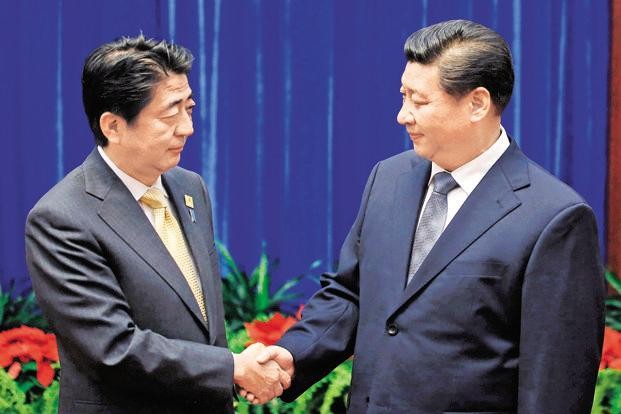Popular Reads
Top Results
Can't find what you're looking for?
View all search resultsPopular Reads
Top Results
Can't find what you're looking for?
View all search resultsAhead of summit, China seeks greater economic cooperation with Japan
China aims to involve Japan in its “Belt and Road Initiative,” a mega economic zone project to nurture the initiative into a new driving force for of its economic growth.
Change text size
Gift Premium Articles
to Anyone
W
hen Prime Minister Shinzo Abe meets with Chinese President Xi Jinping in Beijing later this week, one of the main agenda items at their summit will be strengthening Japan-China economic cooperation.
Abe will make an official visit to China from Thursday to Saturday, the first official visit to China by a Japanese prime minister in seven years, as this year marks the 40th anniversary of the Japan-China Peace and Friendship Treaty. As for China, this year also marks the 40th year since the introduction of its economic reform and open-door policies.
“We want Japanese companies with excellent technologies to invest more [in China].” Requests such as this were made one after another by local businesspeople when the Japan-China Economic Association’s delegation visited the Inner Mongolia Autonomous Region in northern China in early October.
“Since this year started, local governments suddenly became active in approaching us,” said Masashi Iwanaga, director of the association’s Beijing office.
Behind China’s efforts to expedite improvements in its relationship with Japan is the deterioration of the Chinese economy caused by China-US trade frictions.
China’s gross domestic product growth in July-September stood at 6.5 percent, the lowest level in nine-and-a-half years.
Under the situation, China is aiming to get Japan involved in its “Belt and Road Initiative,” a mega economic zone project to nurture the initiative into a new driving force for of its economic growth.
At an economic forum held Saturday in Shanghai, a Chinese expert stressed: “Japan and China should cooperate against protectionism. The Belt and Road Initiative can become the opportunity to promote bilateral cooperation.”
Japanese companies, in fact, have been deeply involved in China’s rapid economic development.
In October 1978, Deng Xiaoping, who was China’s vice premier at the time, made an inspection visit to the Kimitsu Works of Nippon Steel Corp. (now Nippon Steel and Sumitomo Metal Corp.). During the tour at the factory, which was highly automated, Deng appeared to be surprised at how few workers there were. He asked if the factory was closed that day.
It is said that Deng strongly felt the contrast with steelworks in China, which were full of slogans glorifying China’s founding father Mao Zedong, but had yet to take sufficient safety measures.
Deng also visited factories of Nissan Motor Co. and Matsushita Electric Industrial Co. (now Panasonic Corp.). About two months later, he declared the introduction of economic reform and open-door policies.
Since China began these policies, a number of Japanese companies have provided technological cooperation to China. Today, various Chinese products are sweeping the global market.
Regarding the steel industry, China accounts for about half of global production. In terms of the volume of smartphone shipments in the global market, China’s Huawei Technologies Co. ranked second in April-June for the first time, surpassing Apple Inc.
However, Japanese companies are cautious of political tensions between the countries, which can adversely affect Japan-China business relationships, as seen in such past incidents as anti-Japan protests that occurred across China in 2012 concerning the Senkaku Islands.
Though China is sending signals to invite Japanese companies to join, firms remain highly cautious about the Belt and Road Initiative. One Japanese manufacturer said, “We cannot help but take political risks into consideration.”
Whether the summit meeting will be able to strengthen Japan-China ties and become a turning point to powerfully propel the economy is a matter to be watched.
This article appeared on The Japan News newspaper website, which is a member of Asia News Network and a media partner of The Jakarta Post










